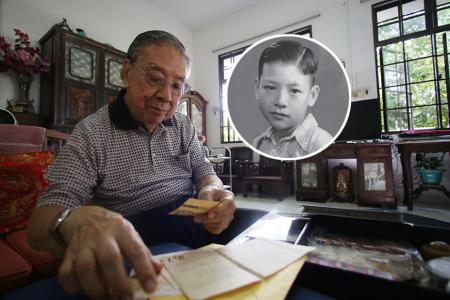Surviving the Second World War in Singapore
It may have been 71 years ago, but Sept 12 will always hold a special meaning for Mr William Gwee Thian Hock.
Mr Gwee was 12 when the Japanese formally surrendered to the British on this date in 1945, ending their occupation of Singapore during World War II.
They had agreed terms with the British on a warship in the seas off Keppel Harbour on Sept 4. The official ceremony was held eight days later at City Hall.
He was barely a teenager when the Allies returned to Singapore, marking the end of three years of terror where he had to grow up in the worst possible way - lacking food, living in constant fear of being executed and being forced to drop out of school.
After the war, Mr Gwee resumed his studies and proceeded to become a senior pharmacist at Alexandra Hospital. He is now retired.
Mr Gwee is the author of three books, two of which recount his family's experiences during the war. His latest book, A Baba Boyhood: Growing Up During World War 2, was published in 2013. It tells the story of Mr Gwee's experiences as a young boy - not just through the anecdotes told to him by his parents, but through his own first-hand experience with soldiers and army officials.
"They were unexpected experiences," he told TNP. "I never knew that I would grow up seeing all this happening around me. Naturally, I matured quite fast because of this. I began to understand hardship and suffering."
Although he's now 82, he still vividly remembers the traumatising years of war.

Mr Gwee pulls out artifacts as he remembers the years of war in Asia between 1941 and 1945. TNP PHOTO: DALENE LOW
TOO YOUNG TO KNOW BETTER
As an eight-year-old child, Mr Gwee did not think too much of the air raids. In fact, his brother and he used to treat these bombings as a game.
However, Mr Gwee also recalls that the war finally became real to him when a bomb dropped two doors away from his house.
"When the bomb dropped, followed by explosions, I was under the dining table. I could see the glasses shatter, the items and crockery had fallen out of their shelves."
The bomb killed a domestic helper and all the chickens in the property.
Mr Gwee's domestic help was also hit by a piece of shrapnel from the bomb and was hospitalised. She survived but left the house after she was released from hospital and never returned, said Mr Gwee.

Ah Lin, who was injured by the bomb, carrying a 1 year old Mr Gwee. PHOTO: WILLIAM GWEE
DEATH ALL AROUND
Mr Gwee spoke of the Sook Ching Massacre, which literally translates into "a cleansing through purging".
The Japanese army used to round up Singaporeans and force them to go through screenings.
While Mr Gwee wasn't harmed by the soldiers, he said that he was afraid of the Japanese soldiers who threw his family out of their home.
"The first time a Japanese soldier arrived - armed with a rifle - to drive us out of the house to the evacuation centre, it was frightening for me because they came shouting and threatening."
Mr Gwee and his family were lucky, as his father used to work for Japanese bosses before the war.
Therefore, presenting just a few photographs of Mr Gwee's father with his supervisors were enough to save the entire family's life on more than one occasion.
Mr Gwee, who was from a Baba family, said that while the Baba Malays held no official allegiance to either the Japanese or the British, they were rounded up just the same as those who were hostile to the cause.
The Japanese soldiers tended to take away and execute those who looked "tough and brawny", said Mr Gwee, "probably to prevent them from later turning into warriors".
Mr Gwee lost a number of relatives, including his uncle (his mother's brother), as a result of the massacre.
In his book, he recalls that his father's brother-in-law was also killed due to his strong body, despite the fact that he held no anti-Japanese sentiment whatsoever.
"So perished many a young Baba in the prime of their lives. They were the cream of the crop and the Baba community in Singapore was never the same again."
DROPPED OUT OF SCHOOL
When war befell Asia, Mr Gwee, then eight years old, was about to start Primary 2 at his school.
Subjects in Primary 2 during the Japanese occupation were simple Arithmetic and English.
"During the Japanese time, it was the same, except they changed the words to Japanese."
Picking up the Japanese language proved to be difficult but Mr Gwee's father took him out of school.
"Boys in my school were chosen to join Japan's naval cadet course," he said. These were groups of students who were sent abroad to train to fight for the Japanese.
"My father anticipated that after a period of time, I might get sent [to the naval cadet course] too," said Mr Gwee. As his father did not want him to learn to fight at such a young age, he took both his sons out of school.
They returned to school after the war ended in 1945.
His experiences during the war also encouraged him to read more.
"For us, and for everybody else, I only learned more after the war had finished. I became an avid reader of everything pertaining to historical events in general, World War 2 in particular."

Mr Gwee offered us his school report card in 1941, from when he was 7 years old. TNP PHOTO: DALENE LOW
ALWAYS HUNGRY
During the war, food products became more scarce as the West began to block imports to Singapore.
The Japanese introduced heavy rationing and made the locals grow more food.

People in Singapore queued for food, which was rationed. PHOTO: SPH
As such, Mr Gwee and his family were forced to begin planting crops such as tapioca, sweet potato and groundnuts in their backyard.
Mr Gwee recalled that the tapioca left the land infertile and the tapioca in subsequent crops became smaller and smaller and the land lost its fertility.
Some resorted to purchasing black market products, while others had no choice but to stick to the tapioca.
The alternative was to eat 'broken rice' by the Japanese, but Mr Gwee said "it was not possible to actually eat".
The family managed to feed themselves by rearing pigs and sending them to a butcher for food.
The embargo on food products proved problematic for the family as well. "We couldn't import from England or Australia. No cheese, no butter..."
To Mr Gwee, the most important lesson that he learnt from the war was that every body was human.
Having grown up in a cosmopolitan environment and living within a walking distance from every religion's house of worship, he learnt that one should treat every one equally.
And while the world has not seen anything close to World War III yet, Mr Gwee said we must all learn to accept each other and live in peace in order to prevent another large-scale war.
"Forget that that person is of a different race, different complexion, different financial background," he said.
"Remember that person as the same human being. You are all children of the same creator. You are all brothers and sisters. We have to live happily together."
Get The New Paper on your phone with the free TNP app. Download from the Apple App Store or Google Play Store now


